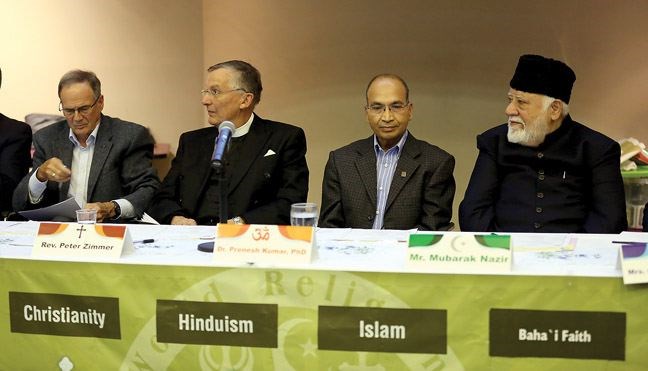A panel of six different faiths found commonality during a religious conference that tasked its speakers to discuss God as myth or reality.
"I don't think it's possible to prove or disprove the existence of God in any rational way," said Anglican priest Peter Zimmer, who presented before an audience of about 80 people Sunday evening at the University of Northern B.C.'s Canfor Theatre for the World Religions Conference.
The question, to him, is the difference faith can make in a person's life.
Zimmer suggested all major religions attempt to answer three questions: where do we come from, where are we going, and what must we do on our way.
Religions interpret differently humanity's problem and how it discovers a solution, he said.
"Christians identify the problem as sin and the solution as salvation. For Buddhists, the problem is suffering and the solution is nirvana," Zimmer suggested. "Each religion has different techniques for moving from problem to solution and different exemplars who show us how to get to the solution.
Before Pranesh Kumar spoke on Hinduism, he invoked a Sanskrit saying: "the entire world is one family."
Where we are born often determines how we identify spiritually, Zimmer said.
"All these religious expressions of culture add a tremendous vitality to the human community. We are different. Our religions are different because they express who we are and where we come from," said Zimmer, who was born in midwestern U.S in the 1950s and has lived in Prince George since 1993.
"If I had been born in a different place, my religion would likely be very different, but my love of God, however I conceived that God to be would be just as strong as it is today.
"There is a broad area of commonality - even agreement - in interfaith dialogue. It is the area of ethics: how are we to live in this world?" said Zimmer before speaking of the concept of the golden rule that also exists in Islam's Hadith on manners: treat others as you wish to be treated.
Before Zimmer started, he showed a playful video about the relevance of his religion.
One image showed a sea of stick people with T-shirts proclaiming, "I'm spiritual, not religious.'
In his speech Surjit Singh Minhas, who spoke for Sikhism, pointed to a March 2015 Angus Reid poll that found more than 40 per cent of Canadians express ambivalence towards religion.
A further 26 per cent, it found, reject it entirely. These results were drawn from a randomized sample of 3,041 adults who are members of the Angus Reid Forum.
Sikhs, Minhas said, believe God cannot be separated from believers and non-believers.
"Accept one another because God lives in every one of us," he said. "Sikh doctrine believes that God resides in the universe and humanity."
Like all presenters, he showed a short video summarizing key tenets of the faith to the audience.
While many people notice Sikhs for their turban and uncut hair, it said not much is known about the world's fifth largest religion.
"Achieving higher consciousness is the goal of Sikh spiritual doctrine," he said.
"We need to be realize who we are: loving, caring, compassionate, humble, contended, tolerant.... harmonious and non-violent. Each and everyone of us can experience this God within us."
"We cannot help everyone in this world, but everyone can help someone," Minhas said.
Before Kumar's speech, a video summary noted some fast facts about Hinduism: it's an ancient religion that ranks third largest for followers in the world; it doesn't believe in a Satan or hell but does believe in reincarnation; and it's the only major religion that has male and female forms as deities.
Hinduism has a Supreme God who can hold three names - Brahma, Vishnu and Shiva - all considered manifestations of the same higher being. Followers can also worship a number of other divinities who hold distinct powers, such as a god of service.
Kumar spoke of the human soul, regardless of religion, and its three qualities - peace, purity and love - and the path to self-knowledge.
When UNBC president Daniel Weeks introduced the conference, he called religion once of the most significant forces in the course of human history.
"It's never been so important globally or even locally right here in Prince George to encourage cooperation between people of different religions," Weeks said.
"We must focus on our similarities and not our differences."
Three other speakers covered the Baha'i faith, Buddhism and Islam at the event, hosted by the hosted by the Ahmadiyya Muslim Community.
It was the 10th time the inter-faith conference came to Prince George and organizers handed out three $500 bursaries to UNBC students.



